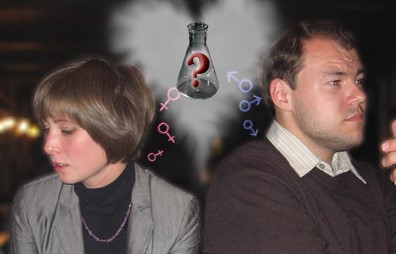
Whatever our strong and positive feelings towards another, we call it love. Psychologists have shown it takes between ninety seconds and 4 minutes to know if you are smitten with someone. This is not just because they have a way with words and make you laugh, but rather through body language (fifty-five percent) tone and speed of their voice (thirty-eight percent) and only seven percent is through what they say.
Scientists have also suggested that we are attracted to somebody because subconsciously we like their genes. Drawing on evolutionary theory, they suggest that it is to our advantage to mate with somebody with the best possible genes that will be passed on to create healthy children for generations to come. Whilst it is difficult to prove definitively, smell (pheromones) may be as important as appearance when it comes to whether we fancy someone.
What is known is that inside the body there are definite chemical signs that cupid has fired his arrow. Helen Fisher of Rutgers University in New Jersey, USA is the best known researcher in the area of love and biochemistry. She proposed that we fall in love in three stages, with different chemicals involved at each stage.
Stage 1: Lust
Lust is driven by initial physical attraction and flirting. This is the first stage of love and is driven by the sex hormones testosterone and oestrogen. Both these sex hormones are found in both men and women. Pheromones, our individual ‘scents’ are also released in human sweat and it is suggested that they play a part in our attracting, and being attracted to, a mate.

Stage 2: Attraction
This is the love-struck phase, when people can think of little else. You may lose your appetite and need less sleep, preferring to spend hours at a time daydreaming about your new lover. Scientists think that three main neurotransmitters called monoamines are involved in this stage; adrenaline, dopamine and serotonin.
Adrenaline
Also known as norepinephrine, adrenaline is activated as a response to love, so that when you meet your new partner, your blood lev
els of adrenalin and cortisol rise causing you to start to sweat, your heart race and your mouth to go dry.
Dopamine
The neurotransmitter dopamine is a chemical that stimulates ‘desire and reward’ by triggering an intense rush of pleasure. Dopamine increases energy and decreases the need for sleep or food, allowing us to focus our attention and take delight in the smallest details of our new relationship. Whilst dopamine is released when we are in love, it is also activated by cocaine and nicotine.
Serotonin
One of love’s most important chemicals that may explain why your new lover keeps coming to mind. The attraction phase changes the way you think. Dr Donatella Marazziti, a psychiatrist at the University of Pisa analysed blood samples from new lovers and discovered that their serotonin levels were equal to the serotonin levels of Obsessive-Compulsive Disorder patients. Serotonin may be responsible for lovers having a rose-tinted view (even a mildly insane view) of their relationship, making us want to stay together to enter the next stage of love, which is attachment.
Stage 3: Attachment
Attachment is the bond that keeps couples together long enough for them to have and raise children. Scientists have found two major hormones are involved in this feeling of attachment; oxytocin and vasopressin.
Oxytocin
Colloquially named “the cuddle hormone”, oxytocin is a powerful hormone released by men and women during orgasm and is thought to deepen the feeling of attachment after sex. The theory suggests that the more sex a couple has, the deeper their bond becomes.
Oxytocin is also said to help cement the strong bond between a mother and her baby and is released during childbirth. Oxytocin is also responsible for the automatic release of a mother’s breast milk at the mere sight or sound of her young baby.
Vasopressin
Vasopressin is another important hormone in the long-term commitment stage and is released after sex. Vasopressin (also called anti-diuretic hormone) was known to work with kidneys to control thirst, but it was later research with prairie voles that created the link to its role in long-term relationships.


